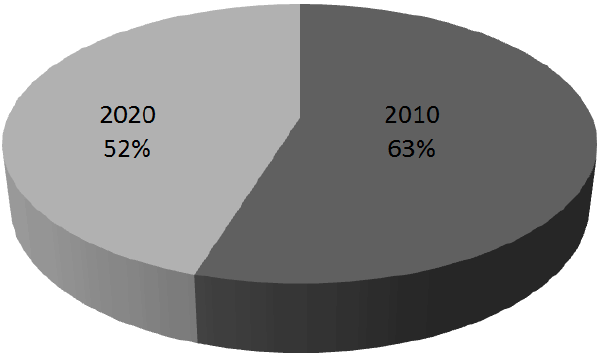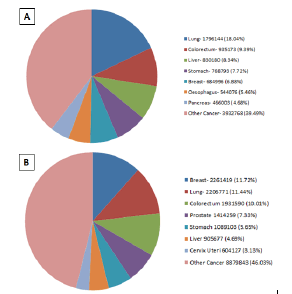Case Study - Onkologia i Radioterapia ( 2023) Volume 17, Issue 7
Epidemiological evolution of colorectal cancer in 10 years: Incidence, mortality and survival: Experience of the medical oncology department of Fez
Soukaina El Anssari*, Youssef Elhaitmy, Lamiae Amaadour, Karima Oualla, Zineb Benbrahim, Samia Arifi and Nawfel MellasSoukaina El Anssari, Department of Medical Oncology, University Hospital Center Hassan II, City of Fez, Morocco, Tel: +212674354846, Email: soukainaelanssari21@gmail.com
Received: 18-May-2023, Manuscript No. OAR-23-99281; Accepted: 01-Aug-2023, Pre QC No. OAR-23-99281 (PQ); Editor assigned: 03-Jun-2023, Pre QC No. OAR-23-99281 (PQ); Reviewed: 25-Jun-2023, QC No. OAR-23-99281 (Q); Revised: 28-Jul-2023, Manuscript No. OAR-23-99281 (R); Published: 07-Aug-2023
Abstract
Colorectal cancer is the second digestive cancer in Morocco after gastric cancer and ranks second among malignancies in terms of incidence and mortality in rich countries. The aim of this study was to report trends in the incidence and presentation of Colorectal Cancer (CRC) over a 10-years period. This is a retrospective study which included 664 patients with colon cancer treated at the medical oncology department of Fez over a period from December 2010 to August 2020. Kaplan Meier method was used to evaluate median survival. The incidence of CRC increased from 48 cases /year to 85 cases /year in 2010 and 2020 respectively. 140 cases were recorded between 2008-2010 versus 190 cases between 2018-2020. We observed a rejuvenation of colorectal cancer with an age ranging from 75 years in 2010 to 65 years in 2020. Sex ratio was 1.6 in 2010 versus 1.2 in 2020. Diagnosis at an early stage of the disease has considerably increased in recent years. We reported non-significant variations in tumour localization throughout the observation period. 52% were metastatic in the ten past years versus 63 %. Colorectal mortality was higher during 2010 (38%) versus (16 %) in 2020.The median overall survival was 23 months versus 32 months in the latest years. Our study showed an increase in median survival with a reduction in mortality over the past 10 years. Important progress has been observed in the treatment of metastatic colorectal cancer in recent years.
Keywords
colorectal cancer, epidemiology, incidence, mortality, survival
Introduction
Colorectal Cancer (CRC) is the third leading cause of cancer death in the world, and its incidence is still rising in developing nations. Most colorectal cancers appear after the age of 60. They most often occur sporadically and it is an inherited condition in only about 5% of cases. Adenocarcinoma is the most common histological type. CRC most often develop on pre-existing adenomas, after a latency period of several years, which makes them accessible to screening and secondary prevention [1]. In the last decades, there has been a significant increase in the incidence of CRC. In Morocco, the World Health Organization estimates the number of new cases of colorectal cancer at 1,271 and the annual number of deaths at 1,185 [1]. In this study we aimed to investigate the incidence rate, mortality and survival of CRC.
Case Presentation
A descriptive retrospective study was carried out in the medical oncology department of the Hassan II University Hospital in Fez, collecting 664 patients with colorectal cancer over a period from December 2009 to August 2020. The Kaplan Meier method was used to estimate median survival. Epidemiological and clinical data as well as the safety profile were collected from medical files in their computerized form (available in the hosix software) or through files archived in the medical oncology department. The different information has been removed from the hosix software available in the service and listed in an exploitation sheet.
Results
Colorectal incidence has been steadily increasing over the years. The incidence increased from 48 cases /year in 2010 to 85 new cases /year during 2020. A total of 140 cases were recorded between 2010-2012 versus 190 cases between 2018-2020. Rejuvenation of CRC patients has been found varying from 75 years in 2010 to 65 years in 2020. There has been a slight male predominance in recent years with a sex ratio (male/female) varying from 1.6 in 2010 to 1.2 in 2020 (Tables 1 and 2).
Tab. 1. Incidence of colorectal cancer over the years
| Years | Incidence of colorectal cancer |
|---|---|
| 2010 | 48 cases/year |
| 2020 | 85 cases /year |
Tab. 2. Sex ratio of colorectal cancer over the years.
| Years | Sex ratio |
|---|---|
| 2010 | 1.6 |
| 2020 | 1.2 |
The proportion of patients diagnosed at an early stage has increased significantly in recent years. 35 patients had an early stage of colorectal cancer between 2010-2012, that is 25%, compared to 66 patients with an early stage of CRC between the periods of 2018 -2020 that is 34% .We observed non-significant variations in tumour localization throughout the observation the observation period. Colorectal cancer survival is highly dependent upon stage of disease at diagnosis .A decrease in the incidence of metastatic patients has also been observed over the years, 52% were metastatic in the ten past years versus 63 % (Figure 1). Colorectal mortality were highest during 2010 (38%) versus (16 %) in 2020. In 2010, approximately 54 deaths by CRC were recorded against 30 deaths in 2017. Median survival of patients with CRC increased significantly.
Figure 1: Metastatic patients over the ten past years
The median overall survival was 23 months versus 32 months in the latest years. We also observed a relative improvement in 5- year survival over this period. The 5-year survival for colorectal cancer improved from 2010 to 2020 from 7 % to 10 % (Table 3).
Tab. 3. Median overall survival and mortality in colorectal cancer.
| Years | Median overall survival | Mortality |
|---|---|---|
| 2010 | 23 months | 0.38 |
| 2020 | 32 months | 0.16 |
Discussion
Colorectal cancer is a major cause of morbidity and mortality throughout the world [2]. It accounts for more than 9% of all cancers [3, 4]. It is the third most common type of cancer and the fourth leading cause of death worldwide [2]. Men and women are almost equally affected; with just over 1 million new cases recorded in 2002, the most recent year for which international estimates are available [2,5,6]. The countries known for the highest incidence rates are Australia, New Zealand, Canada, the United States and parts of Europe. The countries with the lowest risk include China, India, and parts of Africa and South America [7].
The prevalence of CRC has been growing at an alarming rate in recent years. There are about 1.93 million new cases of CRC diagnosed in 2020 worldwide, representing 10% of global cancer incidence (Figure 2A and 2B). Colorectal cancer is ranked the third leading cause of cancer-related death in both sexes, with a slight male predominance, approximately 516,637 deaths in men and 420,536 deaths in women in 2020. Important progress has been made to better understand CRC pathophysiology and expand treatment options, including endoscopic resection, surgical local excision, targeted therapy, radiation therapy, ablative therapies, chemotherapy, and immunotherapy, which increased the overall survival of advanced CRC [8]. Significant differences in CRC survival rate have been reported even in most highly developed countries. Diagnosis of CRC at different clinical stages may explain the marked differences in survival rates [9]. Generally, CRC is asymptomatic. When symptoms of CRC appear, such as abdominal pain, rectal bleeding, anaemia, most patients are already metastatic. In some developed countries, screening programs have been widely offered for over 10 years, with the aim of early diagnosis of CRC and improving treatment outcomes [10-12].
Figure 2: Estimates and proportion of incident cases and deaths of major cancer types worldwide in 2020. A. Estimated number of new cancer cases in 2020 worldwide. B. Estimated number of cancer-related deaths in 2020 worldwide. Source: GLOBOCAN 2020
Following screening programs for breast and cervical cancers, a growing number of countries have introduced population-based colorectal cancer screening programs, targeting mostly people in their 50s and 60s [13]. Countries that have a high incidence of CRC such as Australia, Japan, Republic of Korea, New Zealand, and Singapore have established national population-based screening programs with different methods such as, faecal immunochemical test, flexible sigmoidoscopy, faecal occult blood test. Hong Kong, China; Macau, China; and Thailand have also established regional pilot programs since the 2000s [13-15]. Five-years overall survival for CRC is higher in countries such as Australia, Japan, New Zealand, the Republic of Korea and Singapore, where nationwide population-based screening programs for colorectal cancer have been implemented. By contrast, India and Thailand report the lowest net survival for both cancers in Asia-Pacific [16]. Betweencountry, differences in net survival following a diagnosis for rectal and colon cancer are wide. This requires rapid support in term of treatment and early detection for developing countries. Following an increase in the incidence of CRC and mortality in the world, the implementation of prevention programs such as screening programs, healthy lifestyle education and diet modification are necessary
Conclusion
CRCs represent a serious problem in oncology due to their high frequency and incidence worldwide. Screening has been proven to greatly reduce mortality and may prevent the onset of the disease. Greater international efforts are needed to put into practice targeted prevention strategies that could alleviate the burden of CRC worldwide.
Conflicts of Interest
The authors declare no conflicts of interest.
References
- Belhamidi MS, Sinaa M, Kaoukabi A, Krimou H, Menfaa M, et al. Profil épidémiologique et anatomopathologique du cancer colorectal: à propos de 36 cas. Pan African Medical Journal. 2018; 30(1).
- Bray F, Ferlay J, Laversanne M, Brewster DH, Gombe Mbalawa C, et al. Cancer Incidence in Five Continents: inclusion criteria, highlights from Volume X and the global status of cancer registration. Int J Cancer. 2015; 137:2060-2071.
- Clinton SK, Giovannucci EL, Hursting SD. The world cancer research fund/American institute for cancer research third expert report on diet, nutrition, physical activity, and cancer: impact and future directions. J nutr. 2020; 150:663-671.
- Boyle P, Langman JS. ABC of colorectal cancer: Epidemiology. BMJ. 2000; 321: 805â??808.
[CrossRef]
- Boyle P, Ferlay J. Mortality and survival in breast and colorectal cancer. Nat Clin Pract Oncol. 2005;2:424-425.
- Parkin DM, Bray F, Ferlay J, Pisani P. Global cancer statistics, 2002. CA: Cancer J Clin. 2005; 55:74-108.
- Torre LA, Bray F, Siegel RL, Ferlay J, Lortetâ?Tieulent J, et al. Global cancer statistics, 2012. CA: Cancer J Clin. 2015; 65:87-108.
- Dekker E, Tanis PJ, Vleugels JL, Kasi PM, Wallace M. Pure-AMC. Lancet. 2019; 394:1467-1480.
[Google Scholar] [CrossRef]
- Allemani C, Matsuda T, Di Carlo V, Harewood R, Matz M, et al. Global surveillance of trends in cancer survival 2000–14 (CONCORD-3): analysis of individual records for 37 513 025 patients diagnosed with one of 18 cancers from 322 population-based registries in 71 countries. Lancet. 2018; 391:1023-1075.
- Schreuders EH, Ruco A, Rabeneck L, Schoen RE, Sung JJ, et al. Colorectal cancer screening: a global overview of existing programmes. Gut. 2015; 64:1637-1649.
- Brown LJ, Roeger SL, Reed RL. Patient perspectives on colorectal cancer screening and the role of general practice. BMC Fam Pract. 2019; 20:1-9.
- Xu P, Xi Y, Zhu J, Zhang M, Luka Z, et al. Intestinal sulfation is essential to protect against colitis and colonic carcinogenesis. Gastroenterology. 2021; 161:271-286.
- Lauby-Secretan B. IARC Handbooks of cancer prevention Volume 17: Colorectal cancer screening. Jpn J Gastrointest Cancer Screen. 2020; 58:704.
- Lim MA, Chong VH, Ong SK, Lim YC. Colorectal cancer in Brunei Darussalam: an overview and rationale for National Screening Programme. Asian Pacific Journal of Cancer Prevention: APJCP. 2019; 20:3571.
- Tepus M, Yau TO. Non-Invasive Colorectal Cancer Screening: An Overview. Gastrointest Tumors. 2020; 7:62â??73.
[CrossRef]
- Arnold M, Sierra MS, Laversanne M, Soerjomataram I, Jemal A, et al. Global patterns and trends in colorectal cancer incidence and mortality. Gut. 2017; 66:683-691.



